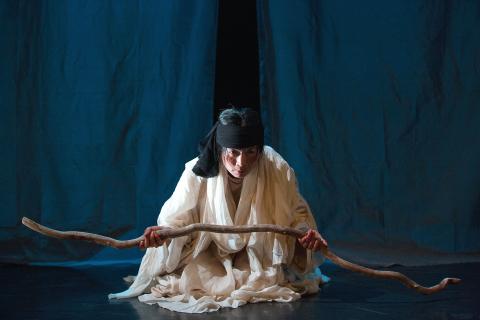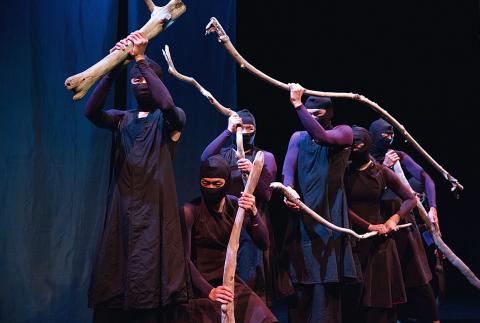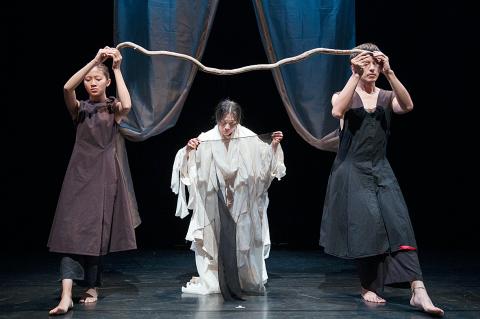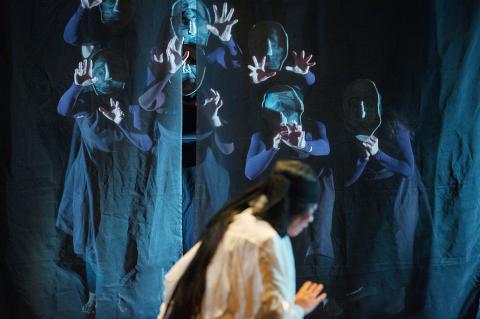Although Sun Li-Tsuei (孫麗翠) studied under France’s Marcel Marceau during the late 1980s, her pantomime doesn’t resemble her late mentor’s Bip the Clown. Instead, Sun and her Shang Orientheatre (上默劇團) are noted for adapting the teachings of Tibetan Buddhism to the stage. Ancient classics from the East and the West also make the sources of inspiration for the mime’s silent art.
INTOXICATED BY PEACE
For its latest production, The Lotus Eater (食蓮者), the pantomime troupe looks into Homer’s The Odyssey to deliver an anti-war message. Based on an episode in the ancient Greek epic poem, the story follows Odysseus and his men on their sea voyage home after the Trojan War. During the journey, they get caught in a storm and land on a strange island where the lotus-eaters dwell. Warm and amicable, the islanders offer lotus seeds and flowers, their staple food, to the exhausted crew. While indulging in the sweet delicacies, the men soon fall into a blissful, trance-like state, forgetting who they are and where they come from.

Photo Courtesy of Shang Orientheatre
In Homer’s work, Odysseus has to force his intoxicated men back to the ship and prevent them from swimming back to the shore just to consume more of the narcotic plants. For Sun, however, the lotus eaters reflects the soldiers’ longing for a peaceful world, an inner serenity away from the tumult outside.
“Our world has become increasingly restless. Wars are frequent. Upheaval grips natural environments… We not only fight against the world outside, but struggle against ourselves. The point is not how to win a battle, but to examine why we wage warfare in the first place,” she says.
Founded by Sun in 2000, the Shang Orientheatre has produced a number of works that mix the elements of pantomime, Chinese martial arts and Ya Yue Dance (雅樂舞), an ancient form of Chinese dance and music.

Photo Courtesy of Shang Orientheatre
ZEN AESTHETIC
With a Zen-like aesthetic, the troupe’s performances always strike one as solemn, meditative and ritualistic, making the performers less mime artists than ascetics in search of spirituality by performing in a highly disciplined manner.
Without a doubt, the pantomime company’s distinct style is rooted in the creative belief of its founder, who speaks of the art of miming as a form of meditation.

Photo Courtesy of Shang Orientheatre
“Pantomime isn’t equal to no talking. It offers a language of silence, a way to reach spiritual tranquility,” Sun says.
More information about The Lotus Eater can be found at the troupe’s Facebook fan page at www.facebook.com/ShangorientheatreOfficialPage.

Photo Courtesy of Shang Orientheatre

No one saw it coming. Everyone — including the Chinese Nationalist Party (KMT) — expected at least some of the recall campaigns against 24 of its lawmakers and Hsinchu Mayor Ann Kao (高虹安) to succeed. Underground gamblers reportedly expected between five and eight lawmakers to lose their jobs. All of this analysis made sense, but contained a fatal flaw. The record of the recall campaigns, the collapse of the KMT-led recalls, and polling data all pointed to enthusiastic high turnout in support of the recall campaigns, and that those against the recalls were unenthusiastic and far less likely to vote. That

Behind a car repair business on a nondescript Thai street are the cherished pets of a rising TikTok animal influencer: two lions and a 200-kilogram lion-tiger hybrid called “Big George.” Lion ownership is legal in Thailand, and Tharnuwarht Plengkemratch is an enthusiastic advocate, posting updates on his feline companions to nearly three million followers. “They’re playful and affectionate, just like dogs or cats,” he said from inside their cage complex at his home in the northern city of Chiang Mai. Thailand’s captive lion population has exploded in recent years, with nearly 500 registered in zoos, breeding farms, petting cafes and homes. Experts warn the

A couple of weeks ago the parties aligned with the People’s Republic of China (PRC), the Chinese Nationalist Party (KMT) and the Taiwan People’s Party (TPP), voted in the legislature to eliminate the subsidy that enables Taiwan Power Co (Taipower) to keep up with its burgeoning debt, and instead pay for universal cash handouts worth NT$10,000. The subsidy would have been NT$100 billion, while the cash handout had a budget of NT$235 billion. The bill mandates that the cash payments must be completed by Oct. 31 of this year. The changes were part of the overall NT$545 billion budget approved

The unexpected collapse of the recall campaigns is being viewed through many lenses, most of them skewed and self-absorbed. The international media unsurprisingly focuses on what they perceive as the message that Taiwanese voters were sending in the failure of the mass recall, especially to China, the US and to friendly Western nations. This made some sense prior to early last month. One of the main arguments used by recall campaigners for recalling Chinese Nationalist Party (KMT) lawmakers was that they were too pro-China, and by extension not to be trusted with defending the nation. Also by extension, that argument could be